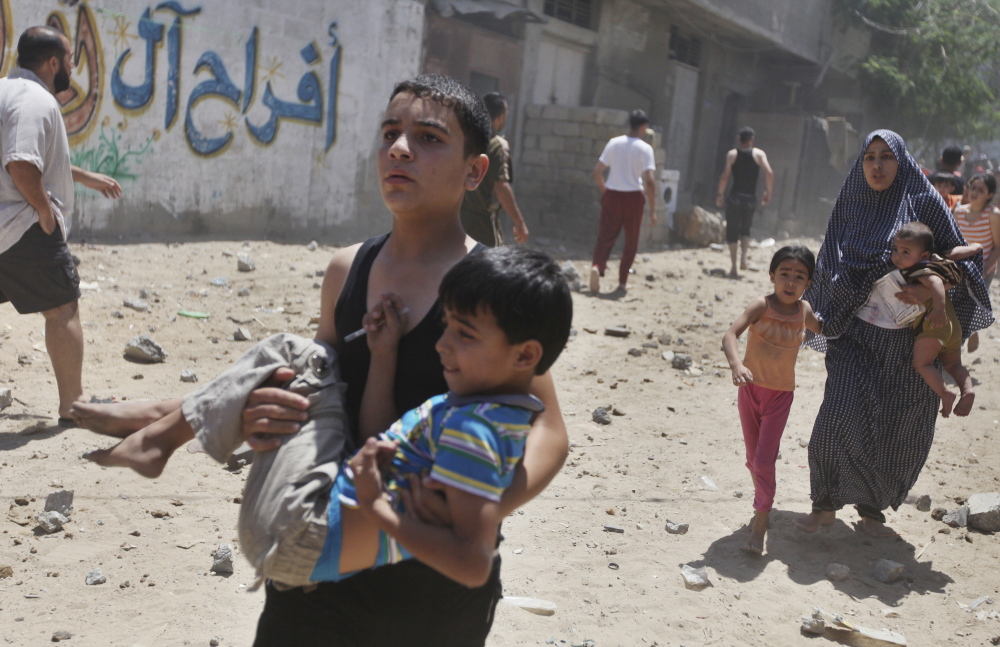JERUSALEM — With rockets raining deep inside Israel, the military pummeled Palestinian targets Wednesday across the Gaza Strip and threatened a broad ground offensive, while the first diplomatic efforts to end two days of heavy fighting got underway.
Egypt, which has mediated before between Israel and the Hamas militant group, said it spoke to all sides about ending the violence. U.S. Secretary of State John Kerry was in touch with Israel to try to lower tensions. And the United Nations chief warned of a “deteriorating situation … which could quickly get beyond anyone’s control.”
As the Palestinian death toll rose above 60, neither side showed any sign of halting their heaviest fighting since an eight-day battle in late 2012.
Israel said it hit more than 300 targets and Hamas positions throughout Gaza, including rocket-launchers, weapons-storage sites and tunnels that it said the group uses to carry out attacks. The military said 74 rockets landed in Israel, including one that reached the northern city of Hadera, the deepest rocket strike ever from Gaza.
“Hamas will pay a heavy price for firing toward Israeli citizens,” Prime Minister Benjamin Netanyahu said. “The operation will expand and continue until the fire toward our towns stops and quiet returns.”
Israel began the offensive Tuesday in response to weeks of rocket launches, and officials said the airstrikes would continue until the firing stops. At least 20 civilians were among the 61 deaths reported by the Health Ministry in Gaza. There have been no serious casualties on the Israeli side.
Thousands of Israeli troops massed near the Gaza border, the possibility of a ground invasion grew larger – along with the risk of heavier casualties on both sides.
“Despite the fact it will be hard, complicated and costly, we will have to take over Gaza temporarily, for a few weeks, to cut off the strengthening of this terror army,” Yuval Steinitz, Israel’s intelligence minister, told Israel Radio. “If you ask my humble opinion, a significant operation like this is approaching.”
The government has authorized the army to activate up to 40,000 reservists, and Israeli TV stations said about a quarter of those forces had been called up, signaling a decision on a ground invasion could still be days away.
A ground offensive in Gaza would be a risky gamble for Israel. It could lead to heavy civilian casualties on the Palestinian side and trigger strong international criticism, as was the case during one that killed hundreds of Palestinians in 2009. Israeli troops would also be at much greater risk if they enter Gaza’s crowded urban landscape, home to 1.8 million people, especially for a long-term presence.
Tal Russo, a former general who retired last year as head of Israel’s southern command, said a ground offensive did not guarantee success. “There is no such concept as ‘decisive,’ and that needs to be understood,” he told Channel 10 TV.
Israeli security officials say they have prepared different scenarios inside Gaza, ranging from a quick pinpoint operation to a full re-occupation of the seaside strip. Israel withdrew from Gaza in 2005.
In the first indication that cease-fire efforts were underway, the office of Egyptian President Abdel-Fattah el-Sissi said he held “extensive contacts with all active and concerned parties” to end the fighting.
It said the two sides discussed the “critical conditions and the need to stop all military action, and to stop the slide” toward more violence. It called on Israel to protect Palestinian civilians.
Egypt negotiated a cease-fire that ended the 2012 fighting, but the situation has changed since then. At the time, Egypt was led by the Muslim Brotherhood, a regional movement that includes Hamas. Following a military coup last year, el-Sissi was elected president, and the new government is far more hostile toward Hamas.
U.N. Secretary-General Ban Ki-moon said he spent Wednesday calling Netanyahu, Palestinian President Mahmoud Abbas, el-Sissi and other regional leaders to push the two sides toward a cease-fire
“This is one of the most critical tests the region has faced in recent years,” Ban told a news conference. “Gaza is on a knife-edge. The deteriorating situation is leading to a downward spiral which could quickly get beyond anyone’s control.”
In Washington, the State Department said Kerry spoke by phone with Netanyahu and planned to talk to Abbas to urge both sides to de-escalate the crisis.
Netanyahu confirmed he spoke to Kerry, Ban and German leader Angela Merkel, but gave no indication the offensive would stop.
“Today I spoke with several world leaders. I appreciated their expressions of strong support for our right and our duty to defend ourselves, and this is what we will continue to do,” he said.
If the offensive drags on, Netanyahu could find himself under increased pressure to halt it, especially if the civilian death toll mounts.
The airstrikes have demolished dozens of buildings. Among the latest dead were an 80-year-old woman, an 11-year-old girl, a 14-year-old boy and two young children. Israel has accused militants of endangering civilians by using homes and other civilian buildings for cover.
Tensions have been rising since the June 12 kidnapping of three Israeli teenagers in the West Bank.
Copy the Story LinkSend questions/comments to the editors.



Success. Please wait for the page to reload. If the page does not reload within 5 seconds, please refresh the page.
Enter your email and password to access comments.
Hi, to comment on stories you must . This profile is in addition to your subscription and website login.
Already have a commenting profile? .
Invalid username/password.
Please check your email to confirm and complete your registration.
Only subscribers are eligible to post comments. Please subscribe or login first for digital access. Here’s why.
Use the form below to reset your password. When you've submitted your account email, we will send an email with a reset code.